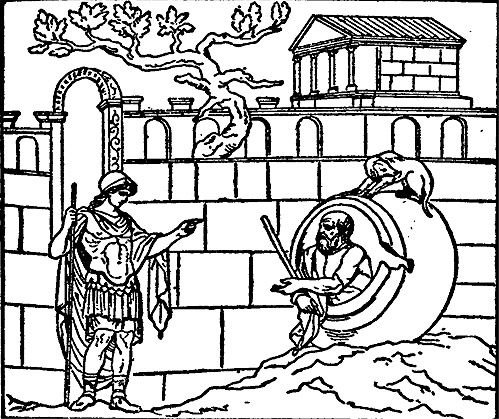Blogging Diogenes of Sinope by Farrand Sayre
I had been blogging for a while and came across a blog entitled Bags in Trees ( I did a search for it just now but it seems to have disappeared). This blog consisted of nothing but photos of plastic shopping bags that had gotten stuck way up in trees. The weird thing about it was that it was actually interesting. The woman who had come up with the idea of the blog had attained some notoriety. I was impressed.
I came up with my own idea for a blog. I would blog a paragraph or two every day from the book Diogenes of Sinope by Farrand Sayre. At the time it was a rare book. Only two were for sale online, and I bought one of them. After it arrived, I went in person to the Library of Congress where I determined (with the aid of Copyright specialists) that the book was in the public domain. Originally I thought I might publish it (it has since been re-published) but instead I decided to blog it.
It made for excellent internet content. This is because it constantly references other ancient philosophers and their works. Even though the book was originally published in 1938, the many references to other philosophers made it perfect for hyperlinking. Tracking down all the referenced philosophers is a wonderful course in ancient philosophy. Moreover, although The Cynic School is almost forgotten now, it had a great impact on ancient philosophy and even the Christian religion. Now we know Saul of Tarsus as St. Paul, the man responsible for spreading the Christian faith. Tarsus was an important city of the Cynic School and of ancient philosophy.
After the image of the famous meeting of Diogenes with Alexander the Great is the first paragraph of Diogenes of Sinope by Farrand Sayre, with hyperlinks.

Diogenes Laertius expresses doubt as to whether "Cynicism was really a philosophy and not, as some maintain, just a way of life" (6, 103). It was sometimes spoken of as a life according to nature. "Cynicism is, as you know, an investigation of nature" (42nd Letter of Diogenes). "Nature has many lessons which we may draw from life and include in our teaching" (6th Letter of Diogenes). The Emperor Julian says; "It (Cynicism) seems to be in some ways a universal philosophy and the most natural, and to demand no special study whatsoever" (6th Oration 187).
The Cynics Referred to the Habits of Animals
Slump towards Animalism
Attitude of the Cynics Towards Pleasure
Happiness Did Not Exclude Pleasure
Diogenes as Hedonist
excellent post.mind blowing post. I'v followed and upvote you. at least 1 upvote me https://steemit.com/news/@currentnews/from-golden-ager-to-goliath-world-reacts-to-trump
I relate mostly towards the Stoic philosophy way of thinking, but Cynicism is my second favorite. Diogenes is always good for a laugh, he was crazy! The way he just didn't care for 'normality' and all the stuff he did. Like when the people called him a dog and threw bones at him, well he went up to them, lifted his leg and pissed on them! Haha, what a guy.
@roomerkind Really good post.
Thanks. I'll keep going with it!
Congratulations! This post has been upvoted from the communal account, @minnowsupport, by roomerkind from the Minnow Support Project. It's a witness project run by aggroed, ausbitbank, teamsteem, theprophet0, someguy123, neoxian, followbtcnews/crimsonclad, and netuoso. The goal is to help Steemit grow by supporting Minnows and creating a social network. Please find us in the Peace, Abundance, and Liberty Network (PALnet) Discord Channel. It's a completely public and open space to all members of the Steemit community who voluntarily choose to be there.